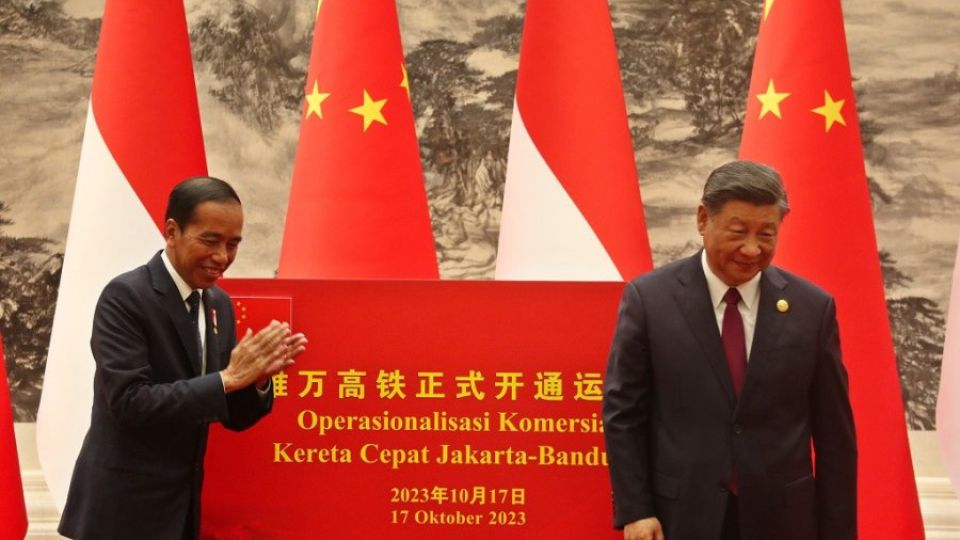October 19, 2023
JAKARTA – During a bilateral meeting with his Chinese counterpart Xi Jinping in Beijing, President Joko “Jokowi” Widodo asked for support in developing renewable energy in Indonesia.
In Tuesday’s discussion, which happened amid the Third Belt and Road Forum (BRF) for International Cooperation, Jokowi also revealed the government’s intention of accelerating the transition to renewable energy with a targeted generation capacity of 60 gigawatts by 2040.
The request for Chinese investment aligns with the latest white paper on the Belt and Road Initiative (BRI), which was released by Beijing earlier this month and states that the country would promote cooperation in green development by leveraging its expertise in renewable energy, environmental protection and sustainable manufacturing.
However, some analysts have opined that China needs to underpin its commitment by halting investment in coal-fired power plants in Indonesia.
Interim coordinating maritime affairs and investment minister Erick Thohir previously said that any energy partnership with China would run parallel to the Just Energy Transition Partnership (JETP), a US$20-billion deal between Indonesia and a group of advanced economies to reduce carbon emissions. He stressed that all cooperation had to be on Indonesia’s terms, not based on the blueprints of other countries.
“China has made great strides in renewable energy development and has massive hydropower, so it would be good to learn from that,” Erick said on Saturday, as quoted by Reuters.
Dozens of Indonesian companies signed deals worth billions of US dollars with Chinese firms on the sidelines of the BRF earlier this week.
Sinar Mas announced in a press release on Tuesday that its subsidiary PT Dian Swastatika Sentosa, alongside PT Agra Surya Energy and PLN Indonesia Power Renewables, entered a joint venture with Chinese photovoltaics firm Trina Solar that was set to start construction of a $100-million solar cell and panel factory in Kendal, Central Java.
PLN also signed a memorandum of understanding (MoU) with China Development Bank (CDB) to accelerate its energy transition efforts.
“PLN is ready, and CDB is coming as a reinforcement,” PLN president director Darmawan Prasodjo said in a statement on Monday.
Fabby Tumiwa, executive director of the Institute for Essential Services Reform (IESR), explained that Indonesia needed around $1 trillion to achieve the goal of net-zero carbon emissions by 2060. According to the IESR research, the country needs to vastly increase the share of solar power in its overall energy supply to reach the target.
And China, currently home to about 90 percent of global solar panel manufacturing capacity and half of global wind turbine manufacturing capacity, could meet Indonesian demand for renewable energy generators.
“Financing is crucial to this transition. Accessible and affordable financing options can accelerate the global low-carbon transition, increase the adoption of green technologies, retire emission-intensive assets and optimize energy asset portfolios,” Fabby said in a statement on Tuesday.
Read also: Whoosh starts commercial operations amid Jokowi, Xi meeting
China is also working on the development of novel nuclear power technology, announcing progress in August on its Huanliu-3 nuclear fusion project and granting an operating license for an experimental thorium-fueled molten salt reactor in June.
However, IESR’s Fabby, who attended the BRF in Beijing, was not aware of any agreement on the development of nuclear power in Indonesia.
Aside from the energy sector, Jokowi and Xi also discussed potential partnerships in the development of Indonesia’s future capital city, electric vehicles (EVs), trade, cross-border payments, petrochemical and steel industries and tourism.
“We need to take advantage of this good momentum to strengthen our bilateral partnership [with China] and intensify concrete collaboration with the region and the world,” Jokowi said in a statement on Tuesday.
Minister Erick previously said that Jokowi would also bring up an extension of the China-funded Whoosh high-speed railway (HSR) to Surabaya, which would extend the route by 700 kilometers. However, no decision on the matter was announced at the BRI summit.
Calls to stop coal investment
Chinese companies have invested in renewable energy projects around the world, and President Xi pledged at the United Nations General Assembly in 2021 that Beijing would stop investing in new coal-fired power plants in other countries.
However, Association of People’s Emancipation and Ecological Action (AEER) coordinator Pius Ginting said that Chinese companies were still the biggest investor in captive coal-fired power plants that supply electricity to the nickel processing industry.
Read also: RI coal retirement program hinges on Cirebon Power deal, say experts
A study from the Center of Economic and Law Studies (CELIOS) points to some Chinese investments in coal-related businesses, such as a power plant built on Obi Island by PT Halmahera Jaya Feronikel, a joint venture between Indonesia’s Harita Group and Chinese firm Lygend. Meanwhile, Power China is involved in coal mining projects in Central Kalimantan.
“It is important to have a sterner discussion on sustainability-based development at the BRF this year, as China’s investment is still far from green. Fossil fuel power plants funded by China still contribute around 245 million tonnes of carbon dioxide every year,” CELIOS executive director Bhima Yudhistira said in a statement on Tuesday.
Muhammad Zulfikar Rakhmat, director of China-Indonesia studies at CELIOS, said Chinese companies still invested far more in fossil fuel energy than in renewable energy. He said 86 percent of energy investment from China still went to the former, through China Development Bank and China Export-Import Bank.
“In negotiations with China, President Jokowi must bring up the interest of society and the future of Indonesia’s just energy transition, not the interests of oligarchs. China must stop its ‘dirty’ investment that negatively impacts Indonesian society and environment, as well as hampering their own strong climate commitment,” Muhammad concluded.


